
views
Understanding Your Abilities

Appreciate your effort. Because you are willing to take a good look at where you are already strong and where you could stand some improvement, you are a strong person already. It takes guts to sit down and do this work. Give your awesome self a pat on the back and remember that you are an amazing person.

Write down what you do. In order to identify your strengths and weaknesses, think about the activities you either participate in the most or get the most pleasure out of. Spend a week or so writing down all of the activities you do throughout a given day, rating them from one to five, depending upon how much you enjoy doing or participating in them. Studies have found journaling to be a great method for becoming more self-aware and reflective towards one’s personal strengths and desires. This can be as simple as listing all of the most memorable moments of a given day to writing detailed narratives about your deepest thoughts and desires. The more you come to know yourself, the easier it will be for you to identify your personal strengths.

Reflect on your values. Sometimes, it can be difficult to identify our strengths and weaknesses because we haven't taken the time to clarify our core values. These are the beliefs that shape how you think about yourself, others, and the world around you. They are fundamental to your way of approaching life. Taking some time to identify your values will help you decide whether aspects of your life are strengths or weaknesses to you, regardless of what others may feel about them. Think about a few people you respect. What do you admire about them? What traits do they possess that you value? How do you see these in your own life? Imagine you could change one thing about your community. What would it be? Why? What do you think that shows about what's most important to you? Remember a moment in your life where you felt very satisfied or fulfilled. What was that moment? What happened? Who were you with? Why did you feel that way? Imagine that your house is on fire (but all pets and people are safe) and you can save just 3 objects. What would you save, and why?

Examine your responses for themes and patterns. Once you've reflected on your values, examine the responses for things that may repeat. For example, perhaps you admire Bill Gates and Richard Branson for their entrepreneurial spirit and creativity. This suggests that you may value Ambition, Competition, and Ingenuity. Perhaps you would change the poverty in your community so everyone has a home and food. This suggests you may value Community, Helping Society, or Making a Difference. You can have several core values. You can find lists of value words online, if you need help putting your own into words.

Determine whether your life aligns with your values. Sometimes, we may feel like we have a weakness in a particular area when our lives don't align with our core values, for whatever reason. Living a life aligned with your values is called "value-congruent" living, and it can lead to greater feelings of satisfaction and success. For example, perhaps you value Ambition and Competition, but you feel stuck at a dead-end job where you're never challenged or given an opportunity to prove yourself. You might feel that you have a weakness in this area because your life isn't currently aligned with what's very important to you. Or perhaps you are a new mother who really wants to go back to your job as a teacher because you value Intellectual Status. You might feel that "being a good mom" is a weakness because your value (of achieving Intellectual Status) appears to conflict with another value (Family-Orientedness). In this case, you can figure out how to balance your values so that you honor both. Wanting to go back to your job doesn't mean you don't also want to enjoy your new child.
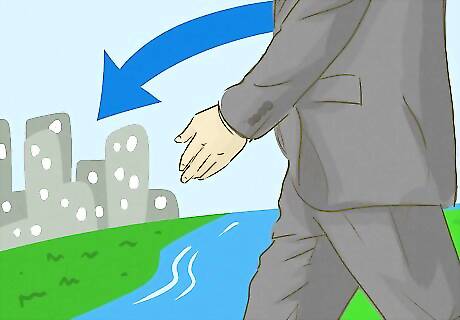
Consider situational meanings. Think about what constitutes strengths or weaknesses relative to the social conventions or customs within your local context. Social conventions are a set of rules governing interpersonal interaction which have been established as functional within a certain geological area or culture, hopefully so as to help maintain healthy social boundaries. Knowing how these differ depending on where you live can help you determine what might be seen as a strength or weakness in that particular geographic location. For example, if you live in a rural area where everyone works with their hands, the members of this community will likely value attributes related to physical labor and working long hours during the day. If you happen to live in a large city, however, these attributes might not appear as important, unless you happen to work some other manual labor job. Consider whether or not the environment you live in is conducive to your own strengths and personal attributes. If they aren’t, think about how you can either change the situation or move to an environment within which your personal strengths might be more highly valued.
Performing a Reflective Best Self Exercise
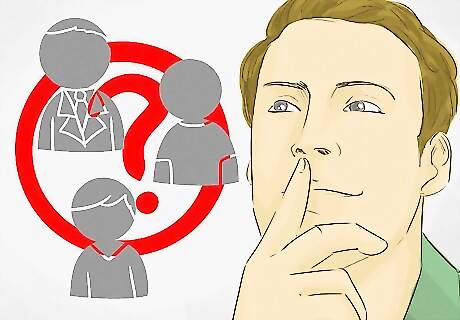
Find people to ask. To help you figure out what your strengths and weaknesses are, you can do a Reflective Best Self (RBS) exercise. This helps you figure out what others think about you in order to help you find your strengths. To start, think of people in every aspect of your life. Include people from work, old jobs, and former professors or teachers as well as friends and family. Thinking of people to ask in all different areas will help you assess your personality on many levels and within many situations.
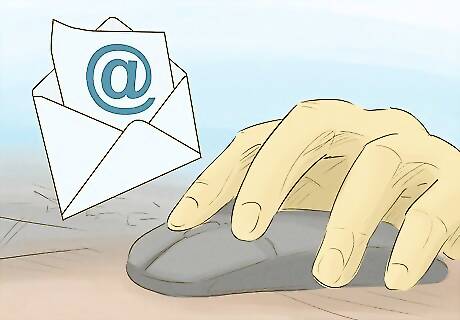
Ask for feedback. Once you've chosen your candidate, send them an e-mail asking them about your strengths. Ask them to give you particular instances where they saw you use these strengths. Make sure to mention that these strengths can be skill-based or personality -based. Both kinds of responses are important. E-mail is typically the best way to do it because it takes the pressure off of doing it on the spot, gives them time to think of a response, and allows them to be more honest. Plus, it helps to have it all in writing for your later analysis.
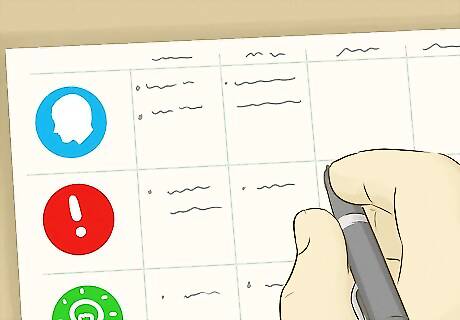
Look for commonalities. Once you receive all the results, you need to look for things that are similar in them. Read through each response and think about what it means. Try to pull out what traits each person is pinpointing, and read the specific instance to see if any other traits arise. After you interpret them all, compare them to one another and find similar traits that many people mention. It might help to make a table with a column for the name of the trait, a column for each response, and a column for your interpretation. For example, multiple people in your life told you that you handle things well under pressure, are good in a crisis, and can help manage other people in stressful situations. This means that you can stay calm under pressure, and you're likely a strong and natural leader. You can also read it as you are compassionate to others and are a people person.
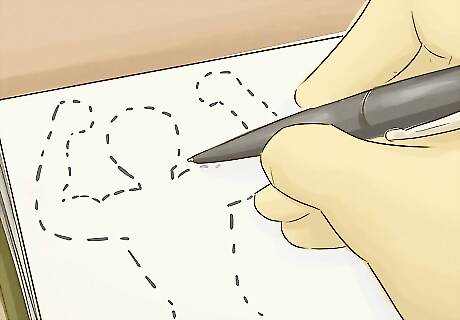
Make a self-portrait. Once you have all the results, write a self-portrait analysis of your strengths. Make sure to incorporate all the different aspects that people pinpointed in their discussion of you and any traits you brought out in your own analysis. This isn't meant to be a complete psychological profile, but an in depth portrait of your best self. It reminds you of the characteristics you use when you are at your best and can help lead your future actions on how to strive to use them more.
Listing Your Actions
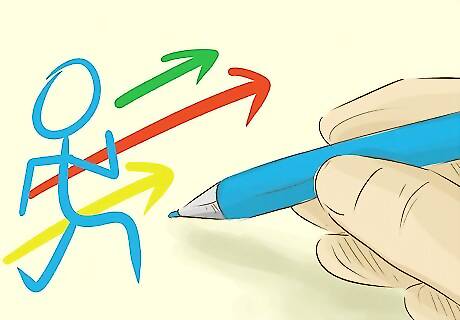
Write about your actions. Consider how you respond in certain situations that require action, thought, and insight. Before doing anything more concrete, try to monitor your spontaneous reactions to experiences you've had in life already. Buy or acquire a journal to write your thoughts in. The reason for doing this is that the spontaneous reactions tell you a lot about how you react in both ordinary and intense situations. You can write them down to help you decipher your actions and abilities.

Think of a challenging situation in which something bad happened. Perhaps it's being in a car crash or a child suddenly dashing out in front of your car while you slam on your brakes. How did you react when confronted with the spontaneous situation? Did you clam up and retreat or did you meet the challenge head on, assembling tools and resources to address the situation? If you took control and acted as a leader, you probably feel that courage and being able to handle these situations is a strength. If you reacted by crying uncontrollably, feeling helpless or lashing out at others, staying in self-control during a challenging situation might be a weakness. Make sure to consider things from several angles. For example, feeling helpless after a car crash is a perfectly natural reaction to the stress of the experience. But, if you went to ask for help from someone, this suggests that asking others for help (collaboration) could be a strength. You do not always have to do everything yourself to be strong.

Find a less challenging situation. Think about a time when you faced a hard decision but one that wasn't so life and death. For example, how do you react when you enter a crowded room? Do you want to engage everyone you meet there or do you want to find a quiet corner away from the noise and connect with just one person? The person connecting with others is strong at socializing and being extroverted, while the quieter person is strong at connecting individually and listening. Both these strengths can be used to the person's natural advantage.

Consider times you faced a difficult personal situation. Think of a time when you've been put on the spot and had to react immediately. How quickly did you learn and adapt to new situations? Are you a fast thinker, rattling off a great comeback when a co-worker makes a snide remark? Or do you tend to absorb, think, and then react in those situations? Remember that any strength you might have developed can sometimes have tradeoffs. If you spend most of your life alone reading and writing, for example, you might not be as apt at small talk as other people, but you will probably have a knack for finding the plot of a book and discussing deep topics with others. You also may have grown up with younger siblings, which means you may be compassionate, patient, and good at diffusing situations. It’s important to keep in mind that the world needs many different people with different types of strengths and interests in order to be as diverse as it is. You don’t necessarily need to be good at everything, just at what you consider important for yourself. The person who rattles off a brilliant comeback or who solves a problem quickly may have quick-wittedness as a strength, and perhaps focus on fine detail as a weakness. The person who takes time to think could be described as having planning as a strength and perhaps limited nimbleness as a weakness.
Listing Your Desires

Ask yourself about your desires. Your desires or longings say a lot about you, even if you've been spending a lot of time denying them. Consider why you want to complete those activities or goals and what it will take to reach them. Chances are, these are your passions and dreams in life, which are typically areas of great strength. Many people fall into the trap of doing what their families want and becoming a doctor or lawyer when they'd rather have been a ballet dancer or a mountain trekker instead. In a different section of your journal, write down your desires or life's longings. Ask yourself, "What are my desires in life?" Whether you're applying for your first job or have just settled into retirement, you should always have goals and yearnings in life. Determine what drives you and what makes you happy.

Decide what you enjoy. Begin to ask yourself about the things you most enjoy in life. Write down the answers to the question, "What types of activities do I find satisfying or appealing?" For some people, sitting by the fire with their Labrador Retriever by their sides is extremely satisfying. For others, they’d rather be rock climbing or taking a road trip. Make a list of the activities or things you do that make you happy and provide you with pleasure. Most likely, these areas where you find your hobbies are some strong areas for you. What activities make you get lost in the moment and enter a state of flow? Those can guide you to your strengths.

Consider what motivates you. Along with your desires, you need to decide what keeps you motivated in life. In your journal, write down your answers to the question, "When do I feel energized and motivated?" Consider times in your life when you feel ready to take the world on by storm or inspired to go to the next level. The areas that inspire and motivate you are typically where you are strongest. Note that many people feel desires very early on in life, indicating the childlike self-knowledge that many come to lose when family, peer, and social expectations or financial pressures push the initial desires down deep.
Assessing Your Strengths and Weaknesses

Rethink your weaknesses. "Weakness" isn't the most helpful way to think about areas for development. In reality, people really aren’t weak, even though we might really feel or think this way at times. However, most people feel that they could be stronger in certain areas in their lives, their skill sets, and other areas. Since they feel they are not as strong in those areas, it’s common to assign the opposite to describe when we feel we need to work on an area to feel stronger and competent. Instead of focusing on "weakness," which has a negative feel to it, think about your areas for growth or improvement -- this keeps you focused on the future and what you can do to get better. Weaknesses could be conceived as something about yourself that you either have the power to improve, insofar as they are at all related to your desires, or are perhaps simply not relevant to your desires or goals in life whatsoever. Acknowledging either one is acceptable. Weaknesses are not permanent aspects of ourselves, but instead are changeable aspects of how we do things so we can become even more excellent.
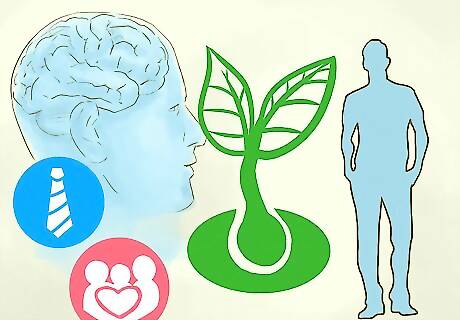
Identify your areas for growth. Areas in which you can develop might be related to anything, including certain professional or social skills or poor self-restraint with food. You could also simply refer to an inability to catch a baseball or perform math equations quickly. Oftentimes, areas for growth are framed in terms of "learning lessons from life" and not repeating mistakes. Other times, it's about making the effort to overcome a lack of skills you perceive in yourself. However, an apparent "weakness" may merely be an indication that a particular activity just isn’t for you, which can be an important thing to admit to yourself. If everyone had the ability to be good at, or even enjoyed, all of the same activities, then the world would likely be a very boring place.
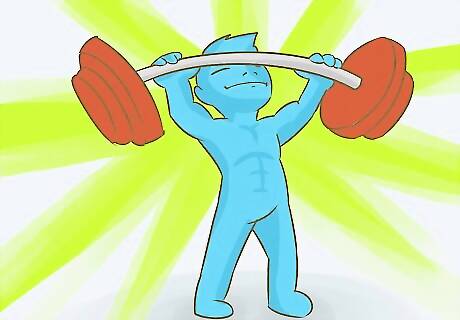
Focus on your strengths. Some might consider focusing on personal weaknesses at all as waste of time, or even a mis-framing of the issues. Instead, focus primarily on your strengths and try to cultivate these whenever possible. This can be a better approach then identifying personal weaknesses. Since what people typically refer to as weaknesses are often simply related to a lack of interest or desire to improve, it might be best for you to focus most on your personal strengths and desires and go from there. Be generous when you are acknowledging your strengths, because you most likely have plenty, even in areas where you feel “weak.” Then zero in on areas where you feel you can be more efficient. For example, if you want to work on becoming more assertive, first start with what assertiveness skills you feel you’re already doing. Maybe you have trouble saying no, but instead you have the ability to state your intentions in a way where your intention is understood and you can spare the feelings of the person. Think about aspects of your personality that you consider strengths. Being kind, generous, open-minded, or a good listener are extremely important strengths that relate to your overall abilities that might get overlooked. Be conscious of these and take pride in them. Another way to think about strengths is to consider them talents, or innate abilities and desires that fit with your sense of self and vision for the future. In other words, these are the things that you'd say "It wasn't effort, I've always had the ability to" do some kind of activity well.
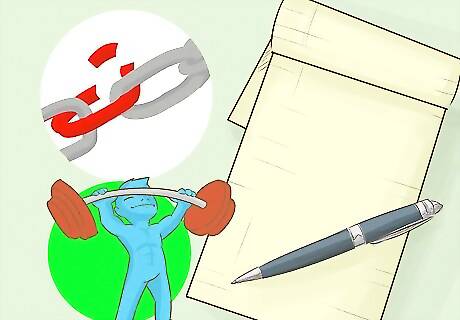
Write down your strengths and weaknesses. Once you assess all you've written down about your actions and desires, it's time to focus on what you think your strengths and weaknesses are. Using the lists from other people you got earlier and that what you have learned about yourself through the other exercises, write down areas of your work and life that you think are your strong and weak areas. Focus on how you currently see your own strengths and weaknesses based on what you're doing in your life right now, both personal and professional, rather than looking to the past or to your desires. Remember, no one is grading you or judging you based on your responses, so be honest with yourself. It might help to draw up two columns with the headings "Strengths" and "Weaknesses." Write them down as they come to you.
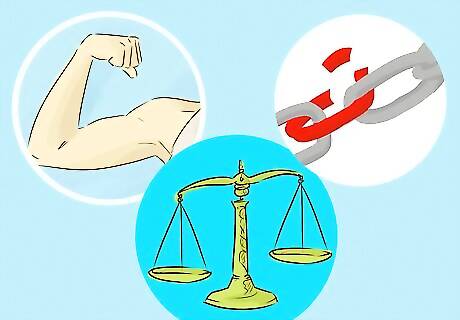
Compare the lists against one another. Did they match up and did you find any surprises? Did you think you were strong in one area but in your actions list that doesn’t appear to be the case? This type of mismatch occurs when you're telling yourself you're one way, but a challenging situation displays your real character instead. How about mismatches between your desires and what you think your strengths are? This mismatch can happen where you've tried to do things with your life based on other's expectations or on your own ideas about what ought to be done, while your desires and actual reactions have been considerably different.

Consider any surprises or mismatches. Look at the different lists you've made. Look for any surprises or places that don't match up. Reflect on why you think that some of the qualities and weaknesses you've spotted have turned out to be different. Is it possible that you think you enjoy certain things or that you're motivated by certain things, but in actuality you can't or you aren’t? These lists will help you see that. Focus on those areas that differ and try to identify situations that address the area. For example, did you write that you aspire to become a singer, but on your lists of believed strengths, you said that you were good at science or medicine? While a singing doctor might be a novelty, the two professions differ considerably. Figure out which area really motivates you in the long-term.

Ask the opinions of friends or family. Have a close friend or family member provide you with constructive feedback. Although self examination can lead you to a few answers, getting an outside opinion will help you either solidify your observations or can shatter a few illusions as well. Learning how to receive constructive feedback from others is essential to being part of a community. It is important not to get defensive, or take it as a personal attack, simply because someone suggests an area of improvement. Learning to incorporate constructive feedback from others into your everyday life can be a strength in itself. If you don't think that a family member can be honest, choose someone who will give you the truth and not sugarcoat or gloss over your weaknesses. Find an external, neutral person, preferably a peer or a mentor, to give you honest, constructive feedback. Ask for feedback on your lists. Have your outside person review and comment on your lists. Helpful comments and questions may include, “What makes you think that you don’t act quickly in emergency situations?” The outside observer may recall an instance where you were the hero of the day during an emergency although you may have forgotten.

Seek professional assistance. If you are still having trouble, or would feel more comfortable with an outside source, ask a professional to help you to determine your strengths and weaknesses. There are companies that can help with psychological profiling, which are often attached to recruiting agencies. For a price, you can take tests to have on-staff psychologists review your personality and professional profiles. While these tests won’t necessarily give you the essence of your personality, they can nonetheless serve as helpful jumping off points for thinking about your strengths and weaknesses. From this, you should find out what they consider to be your strengths and weaknesses. A good test should be long in order to draw out the repeated aspects of your personality. After taking a test like this, be sure to talk directly with the psychologist to work out weaknesses and uncover strengths. There are online tests you can take to assess your strengths and weaknesses. Look for tests that are on reputable sites and that have been compiled by licensed psychologists or similarly-qualified professionals. If there is a cost involved, do some research about the company providing the tests first to make sure you're getting value for money.

Reflect on your findings. After you assess your strengths and weaknesses, spend some time to reflect and determine how you feel about what you found. Decide if you need or want to work on any of your weaknesses and contemplate what you will need to do to attack or change these weaknesses. Enlist in a class or find activities that will address your weaknesses. For example, if you find that you become a deer in headlights when confronted with a spontaneous situation, put yourself in situations where spontaneity occurs. Examples including joining a community theater, participating on a sports team, or doing karaoke at the bar. Consider therapy or ways to talk about fears or concerns. If taking a class or joining a theater group doesn't seem to do the trick or you have deep rooted fears or anxiety that prevent you from moving forward, consider talking with a therapist.
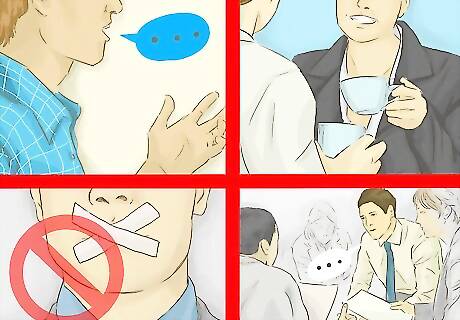
Reject perfectionism. Take care not to become hung up on your weaknesses. This pattern can quickly fall into the nonconstructive pattern of perfectionism, which can actually hold you back from success. It’s better to begin with what you do well for a given skill set, then find several details to enhance those skills and slowly improve over time. For example, you want to improve your communication skills. After some self-reflection, you decide you are actually a pretty good listener, which is your strength. However, you clam up when it’s your turn to speak, which is your weakness. You decide you want to be more verbal, so you work on interjecting maybe a sentence or two within the conversation at small pauses. A perfectionist approach might say that because you are not currently good at speaking, you can't even bother to work on it because you will make mistakes. Acknowledge that mistakes are part of learning and growth and allow yourself to make them as you develop yourself.

Don't deny important moments in your life. Everyone has things in their life that they excel at. There are times when you do something you've never done before, but it just clicks and you find that you're a total natural at it. This might be sport, art, creative pursuits, interacting with animals, or standing in for someone who is away and doing their job. Not everyone will experience the same amazing moments as you, but when you have them, work with it to enhance your life and reach your true potential.
Using the Skills in Interviews

Consider the relevancy of your strengths and weaknesses. You can use all you've learned about yourself to help you in job interviews. Think about how your strengths and weaknesses are relevant to the particular job you are applying for. In order to prepare, think about what tasks might be required for the job you are applying for, and consider all of the times throughout your life when you were faced with similar tasks. Which personal attributes seemed like they’d be either strengths or weaknesses while you were involved in these tasks? For example, if you are applying to be a computer programmer, talk about your strengths that relate to computers or problem solving. However, it might not be especially pertinent to go into detail about your strengths regarding ping pong, unless this is something the employer seems to have an interest in already.

Exhibit honesty and confidence. When you're asked about these characteristics in an interview, be honest when describing your strengths. When interviewers ask you about your strengths and weaknesses, they aren’t merely curious about your skills but also want to know how competent you are at talking about yourself. Social skills and an ability to market yourself is quickly becoming one of the most important set of skills for most jobs in the workforce. For an interviewer, this begins with how well the interviewee is able to describe his or her strengths and weaknesses, and how comfortable they appear doing so.

Practice interviewing skills. In order to become more comfortable with this, practice interviewing with someone else. Ask a friend to interview you and practice describing yourself to her. Do this as many times and with as many people as possible, until you start to feel more comfortable describing your strengths and weaknesses to them. At first it might seem like reading a script, but after a while it should start to feel more and more natural. Before going into the interview, think of as many concrete instances to talk about through which your personal strengths will be made apparent. Interviewers don’t just want to hear what you think your strengths are, but will likely ask for concrete situations within which your personal strengths were essential to how you engaged with whatever problems or obstacles came up. Reflect on these, maybe writing down as many as you can, so that you can go into the interview situation as prepared as possible. For example, instead of saying "A strength is that I'm detail-oriented," give a concrete example: "In my previous job I was responsible for double-checking all the figures in our monthly budgets. In several cases I caught errors that would have cost our company significant money. This attention to detail will serve me well in this position with your company."
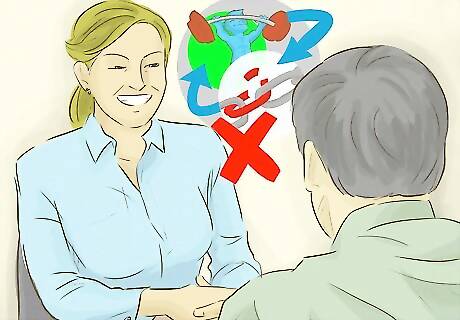
Do not try to "spin." Potential employers are not stupid, and can see right through this cliche attempt. They sometimes interview hundreds of people for a position, and everyone's first instinct is to use what they believe is a strength and spin it as a weakness. However, what you see as "strengths" may not seem that way to employers, who are often looking for employees who value things like flexibility and teamwork. This type of response can often make it seem like you lack self-awareness. Very common spins include: "I'm a perfectionist and I can't stand to get things wrong." Perfectionism is unlikely to strike employers as a true strength, as it suggests that you hold yourself and others to unreasonable standards and may also have trouble with procrastination. "I'm stubborn and I don't let things go." This may suggest that you are not good at being flexible and adaptable. "I struggle to maintain a good work/life balance because I work so hard." This may suggest that you can't take care of yourself and are more likely to burn out or be an unpleasant colleague.

Be honest about weaknesses. When the interviewer asks you a question about your weaknesses, be honest. There wouldn't be any point in asking the question if all you gave the interviewer was some canned response about how awesome you are. The interviewer isn't looking for that. She is looking for a real discussion of things you can work on, a signpost of insight about yourself. Real challenges might include: Being overly critical Being suspicious of authority, of peers Being too demanding Procrastinating Being too talkative Being too sensitive Exhibiting a lack of assertiveness Exhibiting a lack of social tact

Acknowledge the bad parts of your challenges. There are certain parts of these weaknesses that you need to address and speak about how they could affect your performance. It can be quite impressive to talk about how your challenge has affected or could potentially affect your work performance. It shows insight and truthfulness, although you still need to be tactful about what you say. For example, tell them "Right now I am a procrastinator. I realize that this affects the amount of work that I could get done, as well as potentially the work that my colleagues could get done. In college, I got away with it because I knew the system, found a way to game it, and still got my work done. I realize that this won't work in the professional world, because it's really not a great way to work, meet my goals, and get things done."

Show the interviewer how you strive to overcome your challenges. Again, being practical here is better than being idealistic. Giving the idealistic response could seem unrealistic and make you seem like you are trying to talk yourself up. For example, tell the interviewer, "I'm taking serious steps to curb my habit of procrastination. I'm setting artificial deadlines for myself and offering personal incentives to meet those deadlines. This has considerably helped with my issue."

Talk about your strengths confidently. You should sound self-assured, but not cocky. Try to be confident while still staying humble about your achievements and skills. Of course, try to truthfully pick strengths that could be in line with the individual, business, or organization to which you are applying. Real strengths fall into three main categories: Knowledge-based skills, such as computer skills, languages, or technical know-how Transferable skills, such as communication and people management skills or problem solving Personal traits, such as sociability, confidence, or punctuality

Provide examples when talking about a strength. It's all well and good to say that you have amazing people skills, but it's another thing to show it. Illustrate what your strengths look like in real life by providing examples, either from your personal interactions or from your work history. For example: "I am an excellent communicator. I care about the words that I use, and about avoiding ambiguity when I communicate. I'm not afraid to follow up with someone who's senior to me when I don't understand them. I take the time to imagine how different people might interpret questions or statements differently." You can also demonstrate your strengths and skill set by sharing what went well in the past and where you have succeeded in your efforts. If you have won any awards or acknowledgements, you can mention them too.













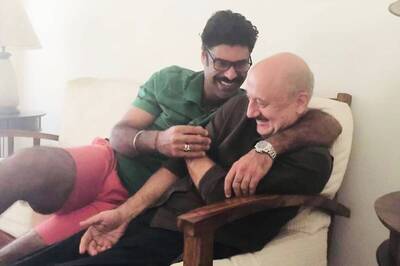





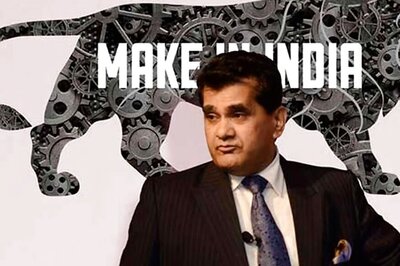
Comments
0 comment